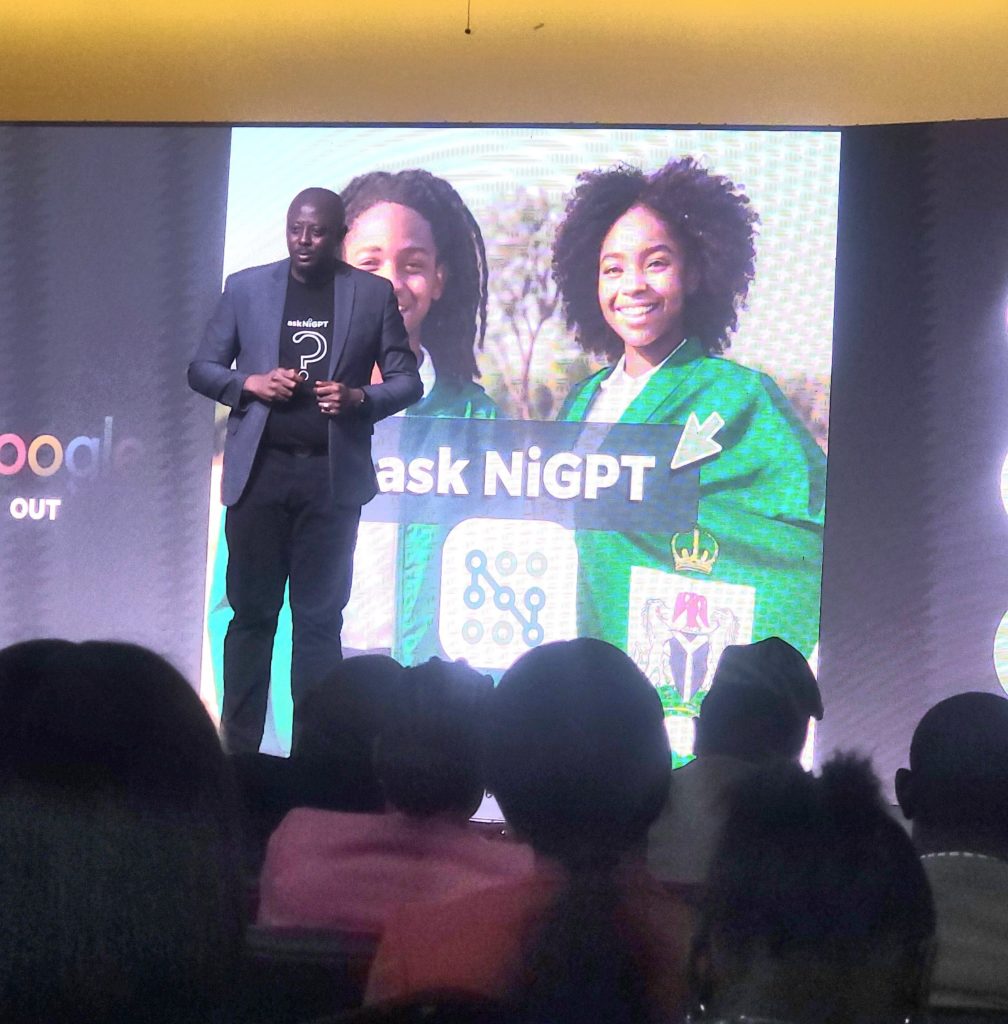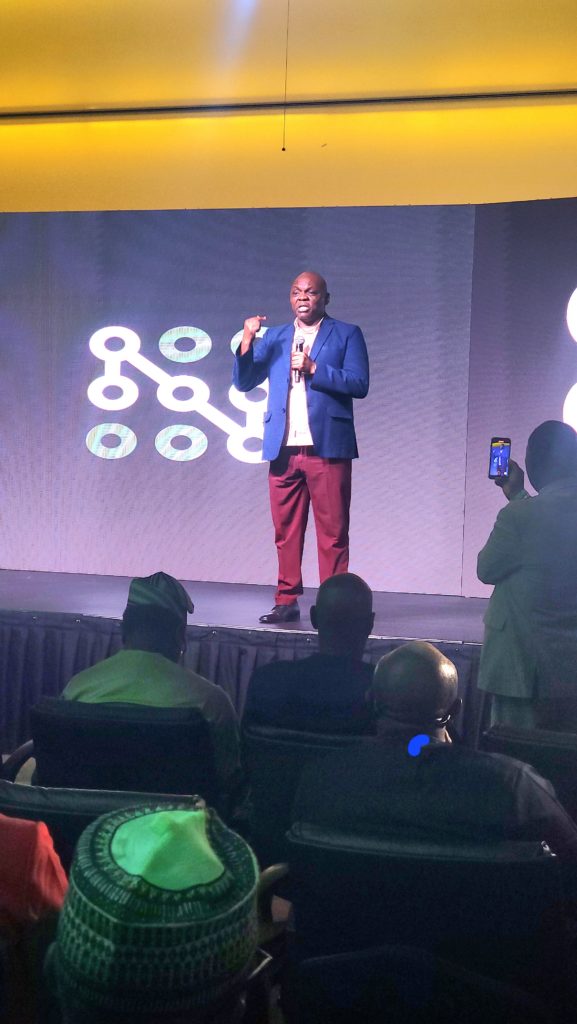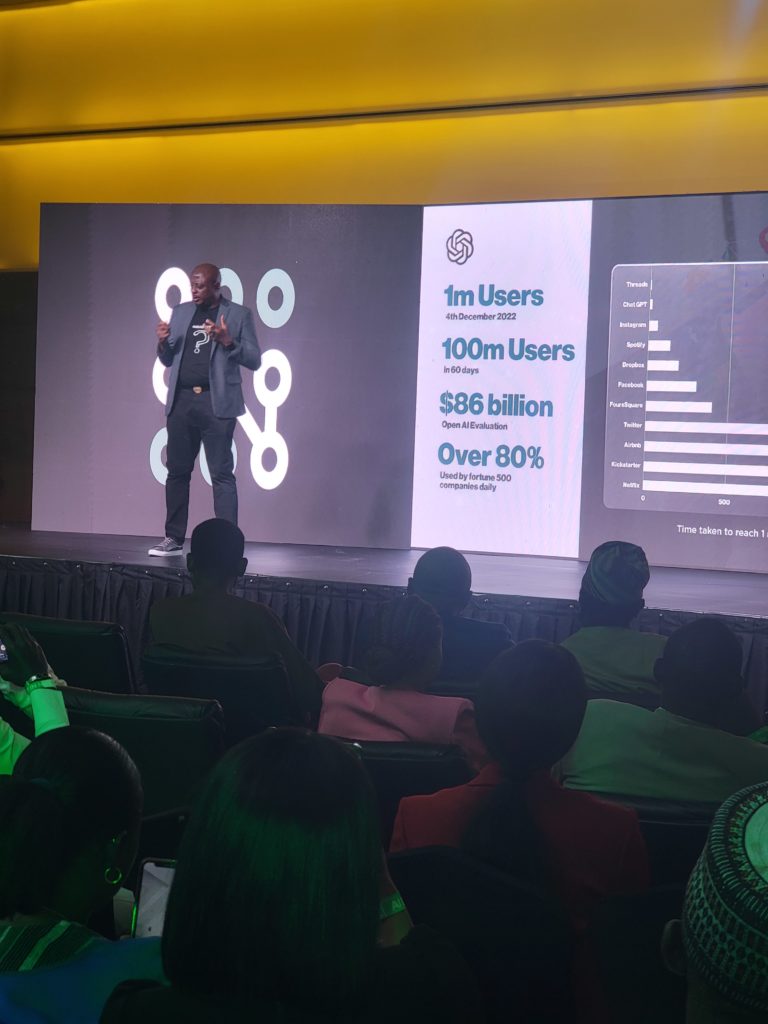On Friday, June 14th, leading software company GreyDots AI launched Nigeria’s first generative AI chatbot named Nigeria Info Generative Pre-trained Transformer (NiGPT). NiGPT is designed to rival other large language models (LLM) like Google’s Gemini and OpenAI’s ChatGPT by offering Nigerian-centric answers. Founded by Arnold Agure-Dam and Julius Oyekanmi, GreyDots AI aims to deliver solutions that augment various sectors of Nigeria’s socio-economic landscape.
The launch, which was held at Eko Hotels and Suites in Lagos, was attended by Ayodele Olawande, the minister of state for youth development; Tubosun Alake, the Lagos state commissioner for innovation, science and technology, representing the Lagos state Governor, Babajide Sanwo-Olu; Sunday Baba the director of public communication and national orientation, representing the minister of information and national orientation, Idris Malagi; Akutah Pius Ukeyima, the executive Secretary of the Nigerian Shippers’ Council (NSC); Paul Harris Ogbole (SAN); and other dignitaries and industry leaders.
The event started with a goodwill message from Uche Nnaji, the minister of innovation, science and technology, represented by Martins Emeje, the director general of the Nigerian Natural Medicine Development Agency (NNMDA). Emeje pledged the minister’s support for innovation in Nigeria, stating that the ministry fully supports any projects developing the country through AI, machine intelligence, and other new technologies.
The evolution of search engines
The opening message was followed by a speech and demonstration by the CEO of GreyDots AI, Arnold Agure-Dam. In his remarks, Agure-Dam talked about the significant scientific evolutions that have brought humans to use artificial intelligence. He discussed how vertical and horizontal search engine iterations led to LLMs.
In the past, Google reigned supreme among search engines, using algorithms to find keywords and display them in search results. The novelty of posing questions to Google and receiving numerous web pages filled with relevant keywords was captivating. “However, as our intellectual needs evolved, so did our expectations for more efficient methods of information retrieval. This horizontal search method began to show limitations as users had to sift through endless material to uncover the specific information they sought.” Argue-Dam said. Recognising the need for improvement, AI-driven vertical search engines which utilise trained large language models to generate answers to natural language questions were created. Vertical search engines bypass the need to sift through endless search results pages.
After its launch, OpenAI’s ChatGPT found rapid acceptance and adoption because it expanded searches from horizontal to vertical. According to Agure-Dam, “By condensing hours of research into mere seconds, vertical search represents a significant advancement in information retrieval. ChatGPT’s success has led to OpenAI’s $86 billion valuation. Now 80% of Fortune 500 companies use ChatGPT for productivity in their daily operations.”
“In an age where information and data are prized commodities, accessing relevant information at our fingertips in seconds is undeniably transformative. ChatGPT’s release has inspired the development of competing products, including Google’s Gemini, Meta’s Llama, Elon Musk’s Grok, Microsoft’s Copilot, and GreyDots AI’s NiGPT,” he added.

To show how GreyDots has improved on OpenAI’s million-dollar product, Argue-Dam followed his speech with a side-by-side demonstration of ChatGPT’s answers next to NiGPT’s. While answering general knowledge questions like “What is the capital of Australia?” How to survive in the Sahara desert? ChatGPT proved competent, but it showed limitations for more nuanced Nigeria-centric questions.
NiGPT showed competence and accuracy with the general knowledge questions but also gave more detailed answers to the Nigerian-centric questions. Due to ChatGPT’s 3.5 macro-based datasets, it is limited in answering nuanced country-specific and current queries, presenting a gaping market need for Nigeria-specific information. By leveraging on a streamlined dataset and adapting a dual language approach, NiGPT can produce accurate and contextually appropriate responses. Agure-Dam noted, “This approach enables our AI to develop a nuanced understanding of the cultural, political, current affairs, and economic intricacies of Nigeria. It provides a depth of understanding that facilitates more insightful and contextually rich responses that surpass the capabilities of legacy systems that rely on broader, macro-scale training datasets such as ChatGPT’s version 3.5.”
NiGPT has many potential use cases in various sectors. It can improve educational content available to students and make it more accessible, enhancing learning outcomes. It can help healthcare professionals analyse large data to improve patient diagnostics, management, and general medical research. Using data-driven insights, NiGPT can assist and improve other industries like agriculture, energy and manufacturing, finance, and entertainment.
NiGPT captures the essence of Nigerian culture in its results, and according to Agure-Dam, it is designed to be a catalyst of change because it allows us (Nigerians) to control the language and narrative used to represent us. “We have revolutionised information access about Nigeria through an AI system that has created a seamless bridge between technology and users. NiGpt is not just a research tool; it is a revolutionary force shaping the future of information access in Nigeria and Africa. Let us finally bask in the magic of being in control of our narrative,” he said.


The road ahead
Upon its release to the general public, NiGPT will include image generation capabilities. Future updates will include a transcriber that will allow users to ask questions and receive answers in local languages. NiGPT is expected to be used in a wide range of applications, placing Nigeria on par with the rest of the advanced world.
The event ended with a vote of thanks by Akin Savage, who hailed Agure-Dam as a visionary and urged the audience to participate and grow platforms like NiGPT. Tubosun Alake, Sunday Baba, and Akutah Pius Ukeyima also gave closing remarks.
Tubonsun Alake brought greetings from the Lagos state government and announced their investment in infrastructure to localise technologies such as NiGPT. He stated that almost $2 billion in data centre investment has been prepared and commenced in Lagos in the past 24 months. Sunday Baba expressed excitement at innovative information technology such as NiGPT coming from Nigerians. He pledged the ministry’s support to NiGPT, asking the founders to leverage the ministry’s knowledge. Akutah Pius Ukeyima congratulated Agure-Dam and spoke about how NiGPT’s launch aligns with President Bola Tinubu’s vision of diversifying the economy to grow it to a trillion-dollar economy in the next four years. With the president looking towards the maritime sector, the sector can benefit from technology that automates their systems and enhances service quality. He urged the public sector to take advantage of what GreyDots AI has started with NiGPT.
NiGPT is not yet open to the general public, but interested users can join the waiting list here to get early access.


















